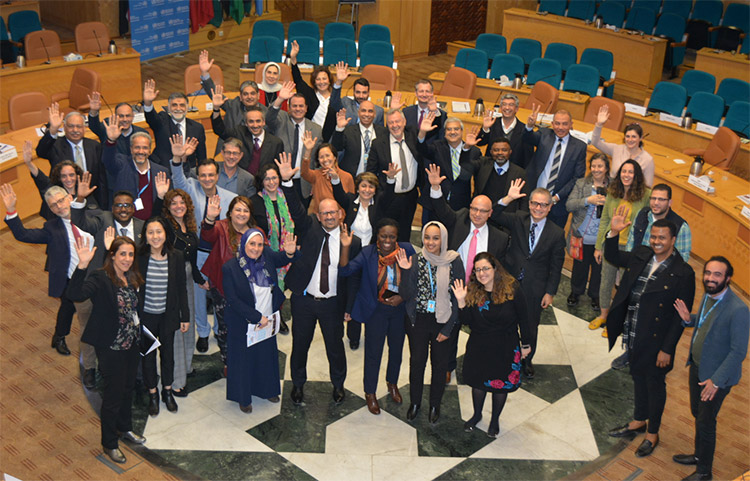
11 March 2020 – Representatives of 12 United Nations agencies gathered for the First Regional Health Forum on 4 March 2020 at the WHO Regional Office for the Eastern Mediterranean to review countries' experience in implementation of the “Global Action Plan for Healthy Lives and Well-being for All” in the Eastern Mediterranean Region, identify the Region’s role in catalysing impact in priority countries and finalize a regional plan of action in providing support to countries.
The forum was part of a series of meetings which have been held by the 12 multilateral health, development and humanitarian agencies to discuss how they can better support countries to accelerate progress towards the health-related Sustainable Development Goals (SDGs).
The Global Action Plan was launched in September 2019 at the United Nations General Assembly. Its implementation is focused on delivering concrete results in countries and accelerating progress towards the SDGs through improved collaboration among the 12 signatory agencies – Gavi, the Vaccine Alliance; the Global Financing Facility for Women, Children and Adolescents (the GFF); The Global Fund to Fight AIDS, Tuberculosis and Malaria (The Global Fund); the Joint United Nations Programme on HIV/AIDS (UNAIDS); United Nations Development Fund (UNDP); United Nations Population Fund (UNFPA); United Nations Children’s Fund (UNICEF); UNITAID; United Nations Entity for Gender Equality and the Empowerment of Women (UN Women); the World Bank Group; World Food Programme (WFP) and the World Health Organization (WHO).
By 2023, the midpoint of the 2030 Agenda for Sustainable Development, the plan envisions better coordination among agencies’ global, regional and in-country support to countries, reduced burden as a result of better aligned policies and approaches; and purpose-driven collaboration integrated into the agencies’ organizational cultures at all levels.
During the forum, countries' experience of implementation of the Global Action Plan in Djibouti, Morocco and Pakistan was shared. The three different country processes demonstrate the importance of taking a whole-of-government approach to addressing health and how the Global Action Plan presents an opportunity to accelerate efforts on population-level interventions. It also highlighted how multilateral agencies could better work together and engage in new areas and in different ways.
Extensive thematic discussions on primary health care, sustainable financing, community engagement, determinants of health, working in fragile settings; research and development, innovation and access; and data and digital health resulted in a draft 2-year workplan to better support countries in the Region.
In the coming weeks, thematic working groups will finalize the workplan and move forward with implementation at the regional level, working closely with global-level counterparts and other partners. At the end of the meeting, participating UN agencies, both Action Plan signatories (UN Women, UNAIDS, UNDP, UNFPA, UNICEF, WFP and WHO) non-Action Plan signatories (IOM, ITU, UNHCR, UNESCO, and UNTIL) welcomed the opportunity to work together and expressed their commitment to action to better support countries in the Region.


